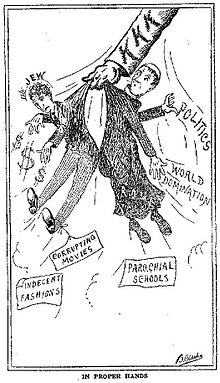- Demonization
-
- "Demonized" redirects here. For the album, see Demonized (album).
Demonization is the reinterpretation of polytheistic deities as evil, lying demons by other religions, generally monotheistic and henotheistic ones. The term has since been expanded to refer to any characterization of individuals, groups, or political bodies as evil.
Contents
Religion
Rather than denying the existence of the other religion's pantheon entirely, the proselytizer says instead that they are not gods worthy of worship but demons trying to deceive their followers. Demonization is most closely associated with Christian missionaries trying to convert pagans, though Judaism, Islam, and other religions have had similar practices.[citation needed]
Many religions, including Islam, Judaism, and Christianity have been demonized, both by elements within their religions and outside. At the extreme, demonizing religion has led to religious violence and wars[citation needed].
In addition to the religious viewpoint, demonization has several potential purposes from a secular standpoint. Most simply, demonization can be used to denigrate an opposed individual or group, making adherents to your own religion or viewpoint less inclined to do business with them (and possibly convert) and more inclined to fight against them. If foreigners are evil and corrupted by demonic influence, then any means of self-defense is easily portrayed as legitimate. Even when not at war, demonization presents a strong justification for the suppression of the demonized religion or group. Arguably, the repeated portrayal of almost all pagans in the Middle East as Baal-worshippers in the Hebrew Bible is an example of this.[1][2] If pagans are corrupted by the demon-"god" Baal, then clearly they must be fought or at least oppressed.[3] Especially in the earlier books of the Hebrew Bible, foreign deities are portrayed as existing and corrupting entities rather than being mere powerless idols. Some would argue this later transferred to Christianity after Constantine I's ascension in its suppression of Roman paganism.[4] Much later, the language of demonization would be invoked during the Spanish Inquisition, leading to the expulsion of Jews and Moriscos from Spain.[5]
The view of early Judaism treating foreign deities as devils and later Judaism treating them as non-existent is not universal. Psalms 96:5, for example, is alternately translated as, "For all the Gods of the gentiles are nothing," "For all the Gods of the gentiles are devils" (Vulgate), and "For all the gods of the peoples are idols."(NRSV) The Greek Septuagint translation of that passage, used by the early Christian Church, used the "devils" version.[4] Jerome would follow the Greek text rather than the Hebrew when he translated the Latin Vulgate edition of the Bible. The "devils" epithet would still appear in Bibles up until the end of the 20th century when the consensus reverted back to the original Hebrew text for modern translations.
Analogs to demonization exist outside monotheistic religions, as well. Polytheism easily accepts foreign gods in general, and in times of conflict, a foreign nation's gods would sometimes be portrayed as evil. Less commonly, it would be applied to other religions as well. For example, some strains of Hinduism consider the Buddha an incarnation of Vishnu sent to deceive people.[6] This view of Buddhism as a trick to test people is less common in modern times[citation needed]; many Hindus still believe that Buddha was an incarnation of Vishnu.
Political conflicts
Demonization is sometimes used against what are arguably political opponents rather than religious ones. The Knights Templar were destroyed by accusations that they worshipped Baphomet from King Philip the Fair. Baphomet, often thought to be Beelzebub, may have been used because of the likeness of this horned deity with the Christian images of Satan[7] [8]
Modern usage
In colloquial usage, the term demonization is used metaphorically to refer to propaganda or moral panic directed against any individual or group.
See also
- Blame
- Criticism of religion
- Demon
- Dehumanization
- Depersonalization
- Dissociation
- Idealization and devaluation
- Moral superiority
- Scapegoating
- Theory of the two demons
- Victim blaming
Notes and references
- ^ "Ye shall destroy their altars, and break in pieces their pillars, and ye shall cut down their groves, and the graven images of their gods ye shall burn with fire." Exodus 34:13
- ^ "And they utterly destroyed all that was in the city, both man and woman, young and old, and ox, and sheep, and ass, with the edge of the sword." Joshua 6:21
- ^ "Demons in the Old Testament", Dennis Bratcher, 2006, retrieved 6 May 207.[1]
- ^ a b "The Greek Septuagint translated into English", Psalm 95:5, translated by Sir Lancelot Charles Lee Brenton, 1851.
- ^ "Edict of the Expulsion of the Jews", 1492, Translated from the Castilian by Edward Peters, retrieved 6 May 2007.[2]
- ^ Cambridge University Hindu Cultural Society
- ^ " Pentacles and Pentagrams", Religious Tolerance, retrieved 6 May 2007
- ^ "Baphomet", Encyclopedia Britannica, 1911 Edition, retrieved 6 May 2007
Categories:
Wikimedia Foundation. 2010.

